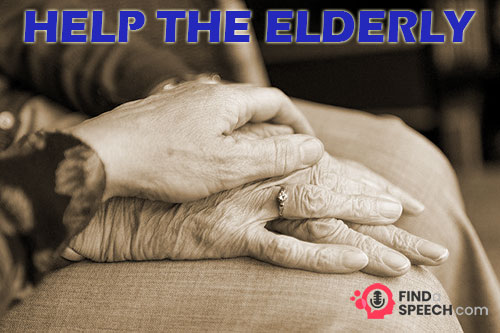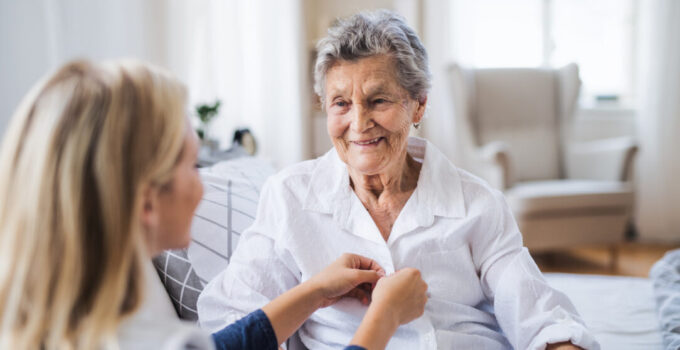People who take care and support elders deserve great respect and high praise. Elderly people are very thankful for the love they receive and importantly, for mental and physical support. When people become elderly we face many day-to-day challenges that were once easier. Fading physical capabilities and sometimes fading mental capabilities places elderly people in an increasingly vulnerable situation so support from carers, family, or able friends is so important for their wellbeing.

Speech on the Elderly
American Author, Leo Buscaglia wisely said, “Too often we underestimate the power of a touch, a smile, a kind word, a listening ear, an honest compliment, or the smallest act of caring, all of which have the potential to turn a life around.”
Who pays for elderly care home stays is continuously a subject of fierce debate in many European countries and the United States.
Elderly people are often means-tested in European countries and have to pay a contribution to their nursing home fees if they’re able. In the UK As of April 2009, the lower capital limit is £13,500 ($17,739 2024 Jan). At that level, all income from savings, pensions, benefits, and other sources, except a “personal expenses allowance” ( £21.90 per week – 2024), contributes to paying the care home fees. The local council pays the remaining amount if the room is not more expensive than the local council’s regular fee.
In the United States, for low-income elderly individuals and families with limited assets, the cost of medical care is
largely covered by Medicare, or Medicaid (financial assistance) This is normally most available after a person has exercised every other option such as using personal funds as a form of payment may cover room and board, therapy or dining expenses.
People of Asia have an alternative outlook and method for treating the elderly. It’s taken as standard and is hardly contentious at all among people of India, Thailand and other old cultures, namely, it is expected of family to look after their needs. In this way, the elderly receive family love and family support in health matters and the care of their physical needs.
The elderly in African countries are increasingly not receiving the care of extended families. Things are changing and it’s a burning issue that has caught the attention of some charity organizations. The United Nations Population Fund estimates that around 50 million African elderly above the age of 60 accounts for around 5 % of Sub-Saharan Africa’s population. In the past, most of them turned to their families for support but that practice is becoming less widespread. Few countries have pension systems set up to support the elderly.
In Australia, the aged care system offers a range of options to meet the different care needs of each individual. Care is provided in people’s homes, in the community, and in residential aged care facilities (nursing homes) by a wide variety of providers. The Australian government provides funding to help students who are completing aged care courses. Here are some potential career pathways within aged care.
From 2016 more than 350 000 aged care workers operated across residential and community settings. The aged care workforce is predominantly female, is generally older than the average across all industries, and has relatively high levels of post-school education and training compared with other industries. Aged care workers provide support to elderly people by assisting with daily activities and personal tasks. This often includes providing support with eating, showering, dressing, tidying, and cleaning. They can work from their client’s home or residential care facility.
The United Nations Populations Fund is pressing governments to look at offering the elderly pensions. They say the benefits would be enormous:
Social pensions can reduce the poverty faced by too many older people, assisting not only older persons themselves but their entire households, even helping to break the intergenerational cycle of poverty.
UNFPA collaborates with the International Institute on Aging in Malta to address the challenges of population aging, and to educate policymakers in starting age-friendly policies and in implementing and monitoring the Madrid International Plan of Action on Aging.
How can we help the elderly? Have you ever thought of getting a career as a caregiver? The emotional benefits to the carer and the cared for can be very real. Very special relationships can be forged. You can earn a very special place in the heart of the elderly patient. ‘Caregiver’ is probably too much of a limited word because many carers become an advocate, best friend, and a part of the family.
I will finish on a light note. For all of you whom wish to live to 100 years old here are the wise words of Woody Allen:
You can live to be a hundred if you give up all the things that make you want to live to be a hundred.
Check for more information here: https://absolutecarehealth.com.au/.




